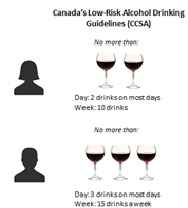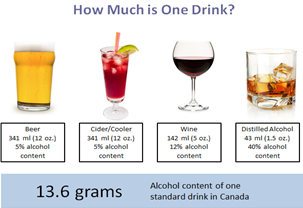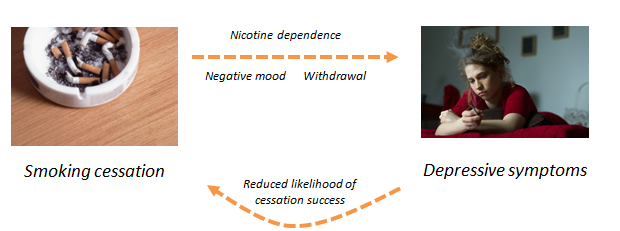There are many other reasons why people smoke! Comorbidity describes when two disorders or illnesses are happening at the same time, for the same person, such as with a drug use disorder and mental illness*. When it comes to quitting smoking, some people can find it additionally challenging because of their comorbidities. Alcohol use, mood, and stress are comorbidities that have been found to be linked to the success of quitting smoking.
Read more about each by clicking one of the following:
Alcohol
When it comes to drinking alcohol, the Canadian Centre on Substance Abuse (CCSA) recommends women drink no more than 2 drinks per day or 10 drinks per week. For men, men should have no more than 3 drinks per day or 15 drinks per week. Drinking above the recommended amount is considered "risky drinking". According to the World Cancer Research Fund/American Institute for Cancer Research, these recommendations are set to limit the potential harm risky drinking has in health problems as research has shown that less alcohol consumption means lower risks of cancer*.


So, what does drinking alcohol have to do with smoking and tobacco use? If you think about reasons why people smoke, some people might tell you that when they smoke occasionally they also drink. In fact, a survey on Canadian Tobacco, Alcohol and Drug use conducted in 2015 showed that for Canadians aged 15 years and older, 13% (3.9 million) of Canadians reported currently smoking cigarettes and 77% (22.7 million) of Canadians reported consuming an alcoholic beverage in the past year. The National Institutes of Health estimates that up to 90% of heavy alcohol users also smoke cigarettes.
Heavy alcohol use makes it harder for people to succeed at quitting smoking. Research shows that for drinkers, being able to stay quit was 15.5% while for non-drinkers this was 30.4%. So, for those who are thinking about or trying to quit using tobacco, it's important to also look at how alcohol plays a role in the attempt to quit.
There is a way to help increase your success in quitting smoking if you do drink, click here to learn more.
*National Institute on Drug Abuse. Comorbidity: Addiction and other mental illnesses.
 back to top
back to top
Mood
How we are feeling plays an important part in our lives. Using substances such as alcohol and tobacco can help some people feel relief from difficult feelings and symptoms of mental health concerns. By using substances, a cycle is created that can make symptoms worse and make it harder and harder to quit using. Severe mood changes can also be the result of an underlying mental health concern such as depression, anxiety, bipolar disorders, and many others. It's important that professionals are involved in supporting those experiencing severe mood changes.

Here are
self-help resources to help manage your mood and quitting smoking. You can also learn more about
research projects around smoking and mood.
 back to top
back to top
Stress
For a lot of people who use tobacco, reaching for a pack of smokes feels natural during times of stress. Many people report having a relief from feelings of stress and are calmed down after using tobacco (e.g. smoking a cigarette, chewing tobacco). The relief and calm come from the
nicotine that is found in tobacco. As nicotine works quickly in the body, its effects are short-lived. What this means is that after using tobacco, people will feel the stress again and it can feel more stressful than before.
There are many reasons why the feelings of stress do not go away with using tobacco (to learn about
stressors). Certain situations and events or changes in life can trigger habits, including using tobacco (to learn about
triggers).
 back to top
back to top
To quit using tobacco can be tough. It's obvious that there are many reasons why people use tobacco.
By taking the time to learn more about using tobacco, you have taken the step towards making a healthier life. Here are self-help resources to manage alcohol intake, mood, or stress.